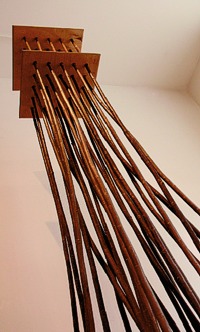The department of design and wood shaping at the School of Fine Arts of J. Vydra in Bratislava is one of not many in Slovakia that devote work to wood in a wide range of activities from crafting the material to design and art and industrial processes up to ecological or protective.
The department has been led by Marián Huba since the 1990s, with whom we were talking about the past, present and the future of this department.
“The basic tasks of the department are aimed at creating furniture, furniture accessories, toys, jewels, sometimes musical instruments or sport accessories. Moreover, we occasionally engage in activities that can be simply named as pro-ecological, pro-social and protective. The main direction of our activities is to look for new forms and functions for the more or less ordinary assortment of products that are easily available on the market; however, our secondary area of activities is directed to topics that are currently only on the border of social interest. However, they therefore create a wide field of new considerations and creative solutions. They also broaden the scale of possible engagement of students in the future.
It is obvious that if we manage to design and implement a functional and comfortable chair that is significantly different from all types of chairs ever produced; this is a success and happiness for both the student-author as well as their pedagogues. However, qualitatively other type of happiness can be felt, for example when saving an old damaged tree or when modelling and re-naturalizing a devastated part of the country as well as when searching and finding other possibilities such as how to more sensitively, more harmonically or more aesthetically include a human work into nature and the countryside (even if it is only a bench, little wall or a path). A similar but “different” satisfaction can be felt if we make handicapped or blind children happy by giving them an unusual or rehabilitation aid, or when we make happy mentally disabled children by helping them create a little statue from wooden waste or a jewel from leftover materials. Another side activity is holiday camps aimed at preserving wooden folk architecture. Apart from helping fragile and fast-disappearing buildings, students also get to know beautiful remote places of Slovakia.”
“It is for sure that in our contemporary civilization, handwork unjustly dropped to lower value level.
Only theoretical intelligence is valued, and it seems to be getting forgotten that creating sensible, functional, lasting and also a pretty craft product also requires a high level of not valued intelligence. When we look at old folk craft, architecture, disappearing structures of historical cultural country, preserving ecological lifestyle, we feel everywhere the deep multigenerational knowledge. And furthermore, the harmony of functionality and beauty. Those are the messages of just lately ceased civilization that was touching things with their hands.
In the ocean of theoretical schools are schools similar to ours: a unique isle where a student has the possibility to create, design and make their work with their own hands up to the last functional and aesthetical detail. Maybe even this is a certain connection to tradition and keeping continuity.”
